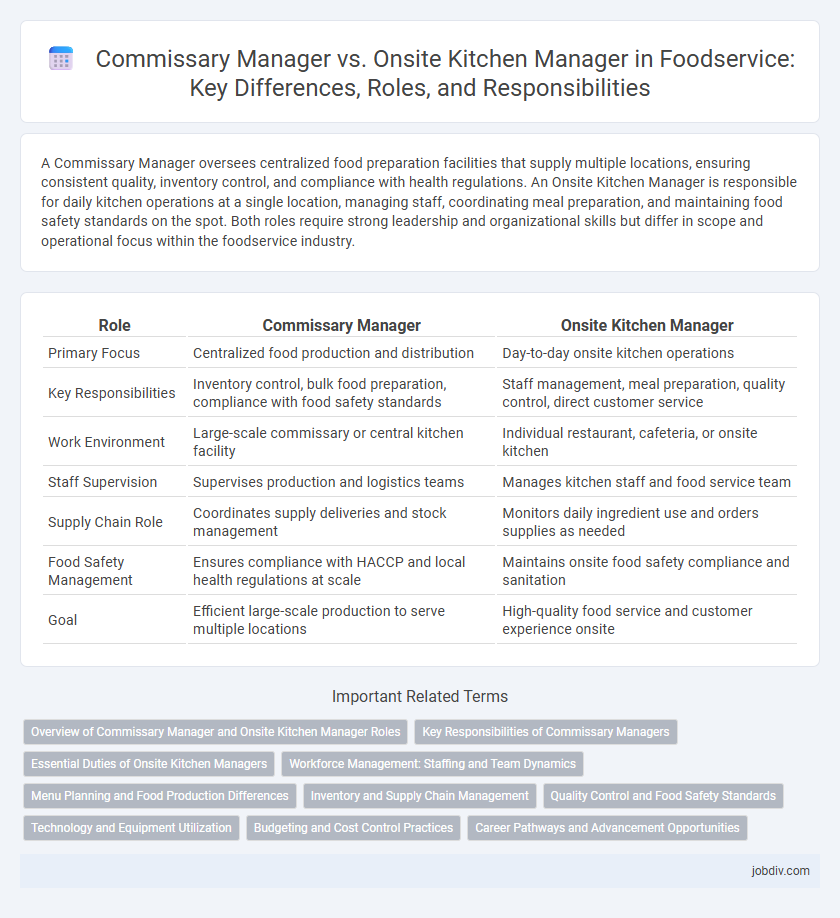A Commissary Manager oversees centralized food preparation facilities that supply multiple locations, ensuring consistent quality, inventory control, and compliance with health regulations. An Onsite Kitchen Manager is responsible for daily kitchen operations at a single location, managing staff, coordinating meal preparation, and maintaining food safety standards on the spot. Both roles require strong leadership and organizational skills but differ in scope and operational focus within the foodservice industry.
Table of Comparison
| Role | Commissary Manager | Onsite Kitchen Manager |
|---|---|---|
| Primary Focus | Centralized food production and distribution | Day-to-day onsite kitchen operations |
| Key Responsibilities | Inventory control, bulk food preparation, compliance with food safety standards | Staff management, meal preparation, quality control, direct customer service |
| Work Environment | Large-scale commissary or central kitchen facility | Individual restaurant, cafeteria, or onsite kitchen |
| Staff Supervision | Supervises production and logistics teams | Manages kitchen staff and food service team |
| Supply Chain Role | Coordinates supply deliveries and stock management | Monitors daily ingredient use and orders supplies as needed |
| Food Safety Management | Ensures compliance with HACCP and local health regulations at scale | Maintains onsite food safety compliance and sanitation |
| Goal | Efficient large-scale production to serve multiple locations | High-quality food service and customer experience onsite |
Overview of Commissary Manager and Onsite Kitchen Manager Roles
Commissary Managers oversee large-scale food production facilities that supply multiple locations, ensuring strict compliance with food safety regulations, inventory control, and operational efficiency. Onsite Kitchen Managers focus on managing daily kitchen operations within a single facility, coordinating staff, menu execution, and maintaining high standards of food quality and customer service. Both roles require strong leadership and knowledge of foodservice operations but differ in scope, with Commissary Managers handling broader logistics and centralized production.
Key Responsibilities of Commissary Managers
Commissary Managers oversee centralized food production facilities, ensuring high-volume meal preparation meets quality, safety, and regulatory standards. They manage inventory control, coordinate logistics for distribution, and supervise staff training to maintain efficient operations. Their role emphasizes compliance with food safety protocols and optimizing supply chain management to support multiple service locations.
Essential Duties of Onsite Kitchen Managers
Onsite Kitchen Managers oversee daily kitchen operations, ensuring food quality, safety compliance, and staff coordination in foodservice establishments. They manage inventory, schedule employee shifts, and directly supervise food preparation to maintain efficient service. Their role emphasizes maintaining hygiene standards and achieving customer satisfaction through effective kitchen workflow management.
Workforce Management: Staffing and Team Dynamics
Commissary Managers oversee large-scale food preparation with a centralized workforce, emphasizing efficient shift scheduling, bulk staffing, and streamlined communication across multiple satellite locations. Onsite Kitchen Managers focus on direct team supervision, balancing daily staffing needs and fostering close-knit team dynamics within a single location. Effective workforce management in foodservice relies on adapting staffing strategies to the operational scale and team cohesion requirements unique to each management role.
Menu Planning and Food Production Differences
Commissary Managers oversee large-scale menu planning and food production designed for multiple outlets, emphasizing batch preparation and standardized recipes that ensure consistency across locations. Onsite Kitchen Managers focus on real-time menu adjustments and food production tailored to immediate customer preferences, managing smaller quantities with flexibility to customize dishes. The Commissary model maximizes efficiency through centralized procurement and bulk cooking, while Onsite Kitchens prioritize freshness and rapid response to daily demand fluctuations.
Inventory and Supply Chain Management
Commissary Managers oversee centralized kitchens that supply multiple outlets, optimizing bulk purchasing and large-scale inventory control to reduce costs and minimize waste. Onsite Kitchen Managers handle inventory and supply chain coordination tailored to the immediate needs of a single location, ensuring real-time stock levels and quick replenishment to maintain uninterrupted service. Both roles require precise inventory tracking and supplier negotiation, but Commissary Managers focus on large batch procurement while Onsite Kitchen Managers emphasize daily operational efficiency.
Quality Control and Food Safety Standards
Commissary Managers oversee centralized food production facilities, implementing strict quality control protocols and comprehensive food safety standards to ensure consistency across multiple locations. Onsite Kitchen Managers focus on maintaining food safety compliance and quality in daily operations, adapting protocols to the specific environment and immediate customer feedback. Both roles require rigorous monitoring of temperature controls, sanitation practices, and employee training to meet regulatory requirements and uphold foodservice excellence.
Technology and Equipment Utilization
Commissary managers leverage advanced kitchen automation systems and centralized inventory software to optimize food production efficiency across multiple locations, enabling streamlined operations and reduced waste. Onsite kitchen managers employ real-time monitoring tools and smart cooking equipment to ensure precise food quality control and timely menu execution within a specific establishment. Both roles prioritize technology integration, with commissary managers focusing on scalability and distribution logistics, while onsite managers concentrate on immediate kitchen workflow and customer satisfaction.
Budgeting and Cost Control Practices
Commissary Managers oversee centralized food production facilities, implementing bulk purchasing and inventory management strategies to optimize economies of scale and reduce food costs. Onsite Kitchen Managers focus on daily operational budgeting, closely monitoring portion control, labor hours, and waste reduction to maintain cost efficiency within individual locations. Both roles require stringent financial tracking systems, but Commissary Managers emphasize large-scale resource allocation while Onsite Managers prioritize real-time cost adjustments.
Career Pathways and Advancement Opportunities
Commissary Managers typically oversee centralized food production facilities, providing leadership in large-scale foodservice operations, which offers career advancement into corporate management or regional supervision roles. Onsite Kitchen Managers focus on managing daily operations within individual venues like cafeterias or restaurants, building expertise that supports progression into multi-unit management or specialized culinary direction. Both career pathways emphasize operational efficiency, staff supervision, and quality control, but commissary roles often lead to broader strategic positions due to their scope and scale.
Commissary Manager vs Onsite Kitchen Manager Infographic

 jobdiv.com
jobdiv.com